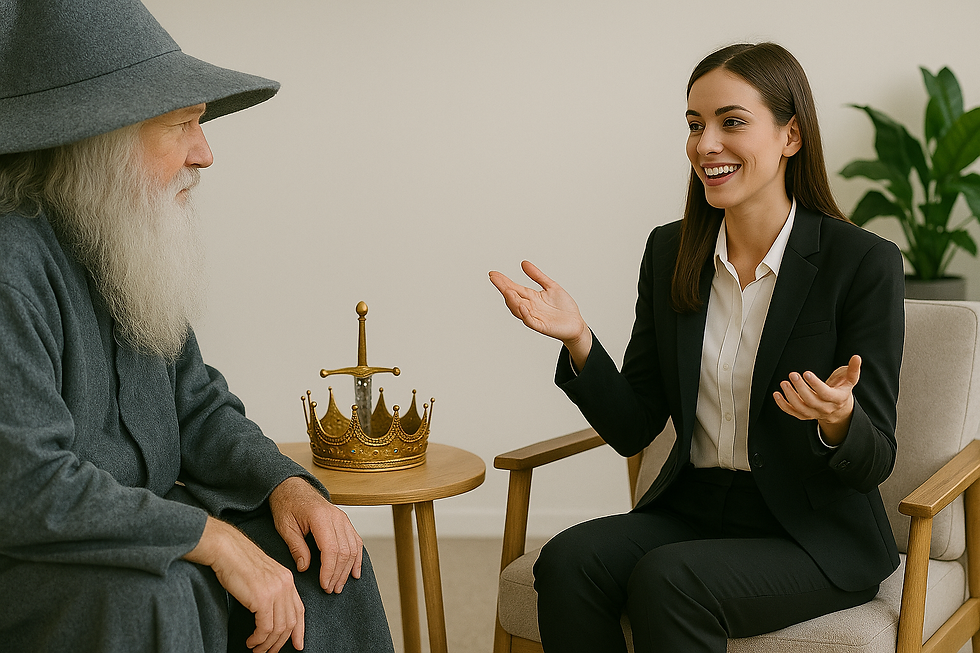Gestalt Coaching For Managers
- Adrian Xuereb Archer

- Jul 12, 2025
- 4 min read
Helping Managers Become Leaders.
Let me introduce you to Leila — a talented mid-level manager with an engineering background, a calm presence, and a quiet drive. Originally from UK, she had relocated to a Malta with a pharmaceutical firm, where she managed a small team. Yet despite her technical brilliance, something wasn’t clicking.

How We Started: Getting To Know Each Other
I was engaged to be Leila's coach after being identified by HR as a potential leader. Her manager praised her competence but hinted she needed to “step up” more. Because of this HR had booked a number of coaching sessions being told:
“I think I need to be more assertive. You need coaching.”
The first meeting was more of a conversation so that Leila and the coach could get to know each other. Through that conversation, they worked on to find out what Leila wanted to work on together. Although there was a direction by the organisation, I was interested to see what Leila wanted in this process, reassuring her that she matters.
Enter Gestalt Coaching: Awareness Through Contact
During that meeting she started explaining her role and her situation. The more we talked the more she felt safe to share that she felt like she had to “earn” her seat at the table again and again. This was frustrating for her and she felt judged by her manager and her peers.
But when we sat down together, I noticed that her voice and body language was telling a different story. She hadn’t fully stepped into her role as a leader. She was still acting as if she was an employee waiting for permission to act.
“You must wear the crown before you are handed the kingdom.”
How Gestalt Coaching Helps Managers?
Gestalt Coaching isn’t about fixing or teaching — it’s about empowering. It works by helping clients become aware of what’s happening in their bodies, minds and hearts and then experimenting with new behaviours in a safe space. It’s not about analysing the past — it’s about creating how you want to shows up at work.
“Becoming aware of our body language, mindset and hearts is the key to feeling alive.”
Once I had Leila's trust I felt safe with her to share what I am seeing and feeling as feedback. Then I would be checking with her how it is affecting her. Usually when this happens, people's faces light up and nuggets of insight appear. As Perls, Hefferline & Goodman (1951) wrote: “Awareness in itself is curative.”
Why This Works?: Awareness & Experimentation
What is Leadership? It is how we carry ourselves, what we feel, belief and act that inspires and leads people to behave. Half of leadership is what we bring to the table. In Leila's case Gestalt Coaching helped her to:
Become aware that because she was waiting for confirmation from others, she was not stepping into her power and confidence.
Explored what it means to step into her own authority — not as a performance, but as a practical way of being.
Through exploration and embodied experiments, she reclaimed what was already within her in a way that is authentic to her.
“Gestalt Coaching helps you experiment a new way of being, one that you feel is authentic and confident in.”
In Leila’s case, we worked with:
Body Awareness: Noticing how she would shrink her posture slightly in team meetings — and learning to inhabit her seat differently. (Literally — we practiced this with a chair!)
Cultural Dynamics: Exploring how her upbringing shaped her view of hierarchy, leadership, and visibility.
Role experiments: I asked her: “What would it look like if you knew you had authority?” She practiced leading conversations, not just contributing to them. We tried statements like: “Here’s what we’re going to do,” and watched how her body and breath reacted.
These experiments brought her into contact with parts of herself she had long kept hidden — confidence, authority, even a bit of humour. She began to own her space.
The Result
A few months later, she led a team restructure meeting. Instead of following the agenda passively, she opened with clarity and warmth:
“As your team lead, I want to talk about how we’ll navigate this transition together. I have a vision, and I’d like you to help me shape it.”
Afterwards, one of her more vocal team members privately said, “That’s the first time I really saw you as our leader.” She was promoted two months later.
Gestalt Coaching is not a quick-fix tool. It’s an experiential, relational, and powerful developmental process. It’s especially impactful for:
Managers transitioning across cultural contexts
Leaders feeling like imposters in senior roles
High performers who need to shift from doing to leading
Think of it like helping someone put on the crown they already own — and feel it settle on their head. Merlin didn’t tell Arthur he was king. He helped him remember it as he had it in him all the time. And that’s what Gestalt Coaching can do. We don’t give people their power. We help them contact it, experiment with it, and finally… own it.
References
Perls, F. S., Hefferline, R. F., & Goodman, P. (1951). Gestalt Therapy: Excitement and Growth in the Human Personality. Julian Press.
Clarkson, P. (2004). Gestalt Counselling in Action (3rd ed.). SAGE Publications.
Nevis, E. C. (1987). Organizational Consulting: A Gestalt Approach. Gestalt Institute of Cleveland Press.




Comments